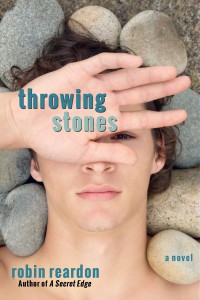
Throwing Stones

Before I begin, I should clarify that M/M and Paranormal YA fiction are two my least read genres, so the three-star rating shouldn’t be taken as a sign of any sort of failure on the book’s part. It’s just not my type of story to begin with.
In this day and age, the idea of one teenage kid teaching an entire community love and understanding sounds like a plot that firmly belongs in the realm of cheesy 80s movies. THROWING STONES manages to make it work—even the smallest actions can have a ripple effect of infinitely greater magnitude, after all. The quality of the writing is the book’s greatest asset, as the story is told with a keen understanding of both psychology and sociology that elevates the material above the usual trappings of the YA genre. Nothing feels cliché, even plot twists that I definitely seen before. To say that about a “paranormal romance” speaks volumes of the work itself.
There are few authors who can compare two wildly different forms of discrimination without cheapening both, but I’m happy to say that Robin Reardon is one of the few who can do it well. She knows when to emphasize the similarities between the oppression of pagans/witches and LGBT individuals, and more importantly, she also knows when it’s important to clarify the two groups’ differences, too. There are some experiences that Jesse has that his romantic interest can never have and vice versa, and they’re showcased spectacularly by Jesse’s own frustrations with the world around him.
Speaking of which, it’s refreshing to see a young character act like a real teenager without coming off as shallow or annoying. Jesse embodies the type of teenage passion that throws itself forward without a second thought for the consequences, and the book does a good job of balancing said consequences without being too critical of them. Whether it be in the coming out/first love narrative or the overarching pagan village plot, it’s a joy to see the character fumbling around and finding his way in life. Unfortunately, I had a hard time connecting with the rest of the cast for this very reason; there’s only Jesse’s interpretation of the characters around him rather than seeing the characters’ actions shine for themselves. Sometimes it works to the book’s benefit, such as when Jesse has a revelation about someone important to him, but other times it felt more like a barrier to the story at large.
In regards to paganism, I have conflicting thoughts about the grove in this book. The flavor of paganism portrayed in THROWING STONES wouldn’t be out of place in an eclectic tradition, and the book thankfully acknowledges that not every pagan practices the same way. There are clear influences from druidry, Dianic Wicca, and plenty of other labels that the average reader probably wouldn’t care about. I fully approve of this vague take on paganism, as many established paths have either experienced LGBTQ+ controversies or have specific rules or practices in relation to young or gay members. Robin Reardon’s system, in contrast, allows for more natural exploration that matches the development of the main character. By the time the paranormal elements begin to filter into the text, it felt completely natural.
At the same time, the “pagans just want to live peacefully in nature and it’s the Christians being intolerant” element rings a bit idealized. There are many pagans, not to mention some Big Name Pagans, who are zealously intolerant of Christianity to the point of hostility. Given that fighting prejudice is a huge component of THROWING STONES, I’m a little surprised that these types of attitudes in the pagan community weren’t touched upon in greater detail. Granted, part of this is because most of the villagers’ distrust is shown through the teenage characters, which severely limits the scope of the issue.
From a story-telling perspective, it must be noted that a lot of time is spent explaining various Wiccanate concepts to Jesse. While necessary to the plot, it unfortunately slows down the book’s pacing to a crawl for a good chunk of the middle of the story.
I would like to give props to the author for being active in the Heathens, Pagans, and Witches Goodreads group discussion about the book. It’s great to see an empathetic author being so open to ideas and making sure that her books are presented in a tactful manner, and it’s a solid read with a great message for it’s intended demographic.
EDIT (5/24/2016): Corrected a minor erroneous opinion.

















